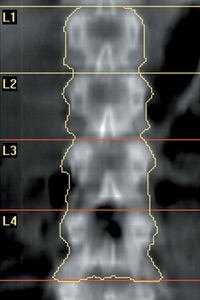Bone density scans for women can save lives


There are few life-threatening conditions for women that are particularly responsive to screening and treatment in order to prevent death or long term disability. Osteoporosis screening is a rare exception. Along with pap smears, lipid screening, mammography and colonoscopy, appropriate use of dual x-ray absorptiometry—“DEXA,” or bone density scan—can help confirm the diagnosis of low bone mass or osteoporosis and can even help predict women’s risk for fracture during her next 10 years of life.
This information is important because 80 percent of all osteoporosis fractures occur in women. We now recognize that women’s bones are smaller than those of men, and when women approach menopause and beyond, or have their ovaries removed, the reduction in their estrogen production leads to a rapid decline in some forms of bone.
It is not unusual for women to present to our emergency department with a fracture of the wrist. Such fractures already specify a diagnosis of osteoporosis, and women who have such a fracture (often in the early postmenopausal period) have a much-increased risk for sustaining a hip fracture.
Fortunately, there are a number of drugs available that can reduce this risk by more than 50 percent. But many women are either not referred or do not seek out DEXA testing. Perhaps the knowledge that the test takes only about 15 minutes and that the radiation exposure is less than that of a single dental x-ray will prompt more women to ask their health care providers if they are a suitable candidate for such testing.
A quick personal checklist may help a woman determine if she has a greater than average risk for fracture. Items that receive a positive check should prompt discussion at the next health care visit. These include:
- History of smoking.
- Weight under 127 pounds.
- A personal or family history of fracture.
- Early menopause (either surgical or natural).
- Use of certain medications, including corticosteroids (prednisone), dilantin (for seizures) or aromatase inhibitors for treatment of breast cancer.
Another way to assess possible increased risk is to have your health care provider carefully measure your height at each annual visit. Even small changes could mean a non-symptomatic compression fracture of the spine.
Besides being tested, what can women do to prevent osteoporosis from occurring? While much of the risk is genetically predetermined, insufficient intake of calcium or exposure to sunlight (vitamin D) can make a woman more susceptible to fracture. Additionally, lack of exercise and reduced personal fitness increases risk.
As both men and women age, the opportunities for falling seem to increase. Most such accidents occur in an individual’s own residence and are almost always preventable. Having adequate hall lighting at night, using non-skid carpets, being especially cautious around pets, and telling your doctor if you become dizzy are a few of the steps that one can take to prevent falls and fractures. Excess alcohol intake (greater than two to three drinks a day) not only predisposes to falls but may independently lead to weakened bone.
Schedule a bone-density scan
Christiana Care offers DEXA testing at four convenient sites throughout New Castle County, in Greenville, Newark, North Wilmington and Smyrna. A bone density examination requires a prescription from your doctor. Talk to your doctor about whether a bone-density scan is appropriate for you, and call 302-838-3088 to schedule your examination.
The results will be shared with you and your primary care provider. If additional diagnostic testing or treatment is called for, the opportunities for consultation with rheumatologists, endocrinologists, or gynecologists and primary care physicians with an expertise in this area are available within the ambulatory care models present at Christiana Care.
Richard J. Derman M.D., MPH, is chair of Obstetrics and Gynecology for Christiana Care. Dr. Derman is a national authority in preventive health for women. He specializes in life quality and improving outcomes for peri- and post-menopausal women and additionally sees patients at the Center for Women’s Health.
The Christiana Care Center for Women’s Health offers a group of women’s health specialists focused on gynecologic issues that may become more complex for women within and beyond their child-bearing years—conditions that can often only be addressed by special consultation, advanced treatment or surgery.